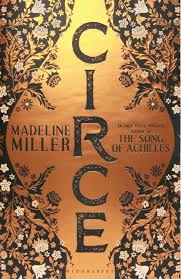Circe. If you cast your mind back to school you may remember her as the witch on whose island Odysseus and his crew washed up on their long journey back from the Trojan War, and wasn’t there something about turning men to pigs and, um, did Odysseus have an affair with her? If you have ever wondered why she lived alone on that island, what made her a sorceress, what happened to her after Odysseus left her to go back to his wife – indeed if you have ever wondered about the reality behind the headline story of any woman who plays a bit part in the (hi)story of men – you have an absolute treat in store with this book.
Circe’s childhood is spent in her despotic father’s court (he is a Titan, the sun god Helios) where she is bullied by her older siblings for not being beautiful enough, sneered at by her parents for having a strange human-sounding voice, surrounded by bitchy cliques of nymphs, naiads and minor goddesses. She is a sensitive, watchful girl deprived of love and unsure of her place in the world.
When I was born, the name for what I was did not exist. They called me nymph, assuming I would be like my mother and aunts and cousins. Least of the lesser goddesses, our powers were so modest they could scarcely ensure our eternities. We spoke to fish and nurtured flowers, coaxed drops from the clouds or salt from the waves. That word, nymph, paced out the length and breadth of our futures. In our language, it means not just goddess, but bride.
An early defining event for Circe is watching the public torturing of Prometheus who, after committing the unforgivable sin of helping mortals, is sentenced to a life of pain, bound on a rock with his entrails ripped out daily. She is the only one who breaks rank to offer him a drink, and it is this streak of kindness and decency in her that sets her apart from the petty and constantly warring Olympians and Titans, and gives her the knowledge that to be gentle is to transgress. But it is also her very ‘apartness’ that leads to her discovering her unusual powers, using them first to find her own identity and love, and then in a darker way – which leads to a lonely exile on the island of Aiaia.
Madeline Miller’s language wraps itself around the reader like an enchantment, managing to convey a classical timbre as well as a modern pulse of truth. True, she has chosen a rich subject – the plants, herbs and flowers that provide the basis of Circe’s art; the hideous monsters; the dreadful deaths wreaked by mortals and gods alike, all set against the backdrop of the seas and islands of Greece – but she sustains a compelling narrative that will suck you in and will make it hard to put this book down. Woven through the tale though are events familiar to everyone: childbirth, broken love affairs, betrayal, sibling rivalry, the yearning for acceptance and the complex relationship between man and the divine. At every step you feel for Circe, even when she is using her powers against others.
I had no right to claim him, I know it. But in a solitary life, there are rare moments when another when another soul dips near yours, as stars once a year brush the earth. Such a constellation was he to me.
When she lets her only son go she speaks to every ‘empty nest’ mother:
I would not be able to bear it, I thought. I would seize him, hold him to me. But I only embraced him a final time, pressing hard as if to set him into my skin. Then I watched him take his place among them, stand upon the prow, outlined against the sky. The light darted silver from the waves. I lifted my hand in blessing and gave my son to the world.
Scratch the surface of these famous myths and you will find abuse, murder, rape and abandonment. Miller has mined not just the Odyssey and the Iliad but also later re-tellings of classical tales (Ovid, Virgil and Shakespeare are all in there) in order to flesh out Circe’s story. Over the course of the novel we meet Icarus and Daedalus, the Minotaur, Jason and Medea, Scylla, Hermes, Penelope and Telemachus – all of whom feel like fully rounded characters, and not necessarily the ones you think you know. Hermes is an untrustworthy gossip; Jason a petulant adolescent; Odysseus cannot cope with life as a civilian and his long-awaited return is a disappointment to his wife:
Odysseus’ favorite task was the sort that only had to be performed once: raiding a town, defeating a monster, finding a way inside an impenetrable city.
Madeline Miller is not alone in taking a woman with a walk-on part in a classical myth as her raw material (there seems to be a bit of a current trend) but what she hasn’t done is re-imagined Circe in modern terms: her heroine is very much rooted in her era. Despite this Circe is very much a woman for our time – a woman who suffers in a patriarchal world yet makes the best of her situation. Far from railing at her misfortune at being left alone on a remote island, she sets about discovering the flora and fauna and perfecting her art. She picks herself up from every hurt and betrayal, each time stronger than before, using her magic to defend herself and those she loves. This is a Circe who will not allow herself to be written off as a ‘witch’, a Circe who is dignified and kind and clever, and whose end makes perfect sense.
This is one of those books that I guarantee will stay with you for a long time.
Circe is published by Bloomsbury, 352 pages.





